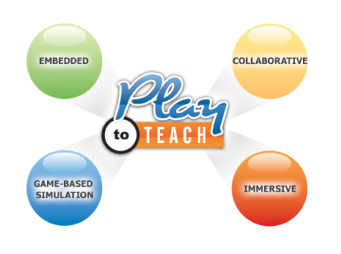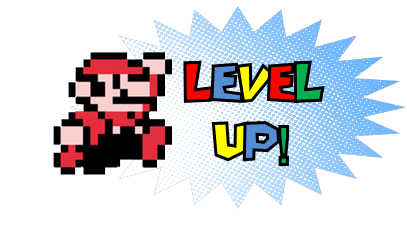Read – An Introduction to Game-Based Learning
Using games for learning purposes is hardly a new innovation. Gaming has, in one form or another, been a part of education since its inception. Today, we consider game-based learning (GBL) as simply the integration of games or gaming mechanics into the educational experience1. Educators who implement game-based learning do so because of its capacity to create interactive and  enjoyable learning opportunities. Video games are a natural fit for game-based learning because of their interactivity, capacity for collaboration, and built-in achievement system. They can be designed to teach a certain subject, expand concepts, reinforce development, understand historical events, or assist in acquisition of skills. Development of digital game-based learning (DGBL) has taken traction over the last several years with a growing number of companies and pro
enjoyable learning opportunities. Video games are a natural fit for game-based learning because of their interactivity, capacity for collaboration, and built-in achievement system. They can be designed to teach a certain subject, expand concepts, reinforce development, understand historical events, or assist in acquisition of skills. Development of digital game-based learning (DGBL) has taken traction over the last several years with a growing number of companies and pro ducts appearing on the market. Research in the area is also expanding with over 12000 articles published this year alone. Journals and conferences dedicated to DGBL have also emerged giving further evidence to the growth of this field.
ducts appearing on the market. Research in the area is also expanding with over 12000 articles published this year alone. Journals and conferences dedicated to DGBL have also emerged giving further evidence to the growth of this field.
As video game technology progresses, so does the capacity for video game developers to create immersive learning environments. This doesn’t necessarily mean an 8-bit game such as Oregon Trail has any less capability to teach as a modern online game such as Little Big Planet. However, recent innovations such as massive online environments, the integration of social communities, badges and other achievement systems, bring with them new possibilities for creative developers of DGBL. By no means have efforts to integrate education and video games been without failure or controversy. However, proponents believe that by putting the creative potential of video games in the hands of imaginative people that the sky is truly the limit for the current and future implementation of DGBL.
Watch – “Video Games and Learning”
Watch this interesting introductory video about using video games for learning, just to get your brain juices percolating:
View – Infographics
Check out these informative infographics
1. “The Gamification of Educuation” infographic illustrates the key concepts of gamification in education.
2. “The Benefits of Video Games” shows why video games are good for us.
3. “Do Educational Video Games Actually Work?” further conveys the benefits and criticism of educational video games.
Participate – A Survey
Click here and take the survey about your experience with game-based learning.


This is a very enthusiastic introduction, and has piqued my interest! Great choice of media, especially the video. I personally didn’t complete the quiz because the questions don’t apply to me and my field right now. BUT I do like the idea of using the principles of gaming in real life classroom situations. Something about competition and teamwork gets students of all ages more excited about doing a better job. If I am ever a classroom teacher for children again, I think it would be exciting to use the premise of popular video games as a kind of ongoing adventure in the real environment of the classroom. Like collecting stars to gain “lives” or grow “invincible” for a class, I would have to research about something more current than Super Mario Bros. because that’s all I really know.
Thanks got the comments. We are looking at developing one of our on-line courses into a game. The program we are looking at is in early learning child care.
It’s funny, I’m doing a group project on the same topic this week in another class. I’m interested to see the similarities and differences in the way we presented! http://etec511historyphilosophy.weebly.com/ Level up!
Hi guys,
I really liked the video you posted here. Their talk of the divide between educational games and fun games really sank in. Reaching back to my gaming days I remember attempts of games to throw in educational material, and I remember resisting it quite strongly. At the moment I don’t currently game anymore, maybe it is possible that game developers have improved this skill. I was wondering if you could look at extending the survey for a few days, I tried to do it just now but it says the survey is closed. Sorry for being later…
I think that as gaming becomes more and more accessible and mainstream (I do still remember the days where I had to beg my dad to sign up for AOL trial internet!), educational gaming will take off, too. I know tons of people who are now going to university specifically for gaming design and I think eventually students won’t even be able to distinguish what is an educational game from a non-educational one. That being said, who’s to say that students (and non-students) don’t learn other valuable skills from gaming, like communication and strategy.
I think a bit of a downfall for the survey is that it is very geared toward teachers. As a non-teacher (perhaps one of the few in the class), I didn’t find that I could answer the questions in any meaningful way, so I didn’t complete it! Sorry!
I refuse to believe that the size of the consumer market using Farmville (mentioned in one of the Infographs) is an indicator of opportunity for the educational gaming market. What really is the opportunity for this emerging market if most institutions cannot afford the costs associated with the design of complex game environments?
I think that there is value in game-based learning, but the teacher must play an integral role in the student-based/student-centered learning environment. Also, before any computerized game-based learning can be introduced, there are hurdles to consider: hardware money, software money, parent buy in, teacher buy in, district buy in, technical support, and so on. Of course, there are many free computer-based learning games, but there are still the other said hurdles to overcome, which are prevalent and entrenched. When it comes to educating K-12 students, I do not think that the public education system is ready to replace physical game-based learning with computerized game-based learning, especially at the primary grades. Lastly, there have been instances where schools showcased iPads being used in the classroom, but any hype is never long lasting because teachers, especially at the primary and at the elementary grades, prefer project-based learning to game-based learning.